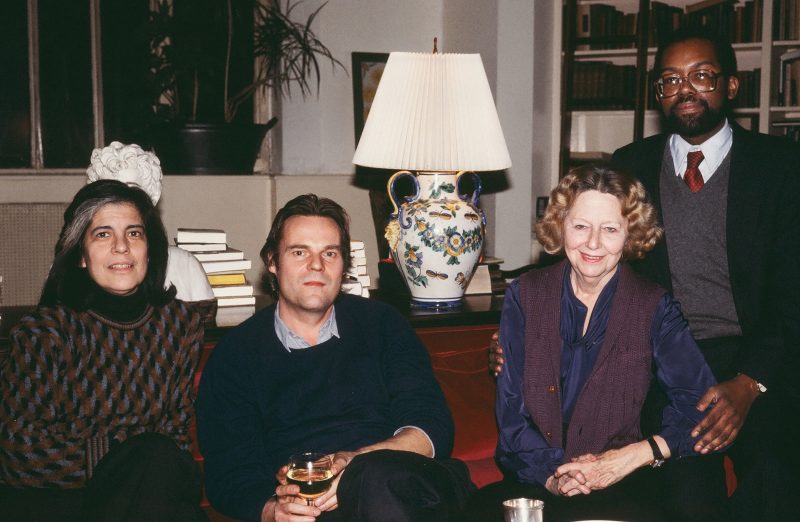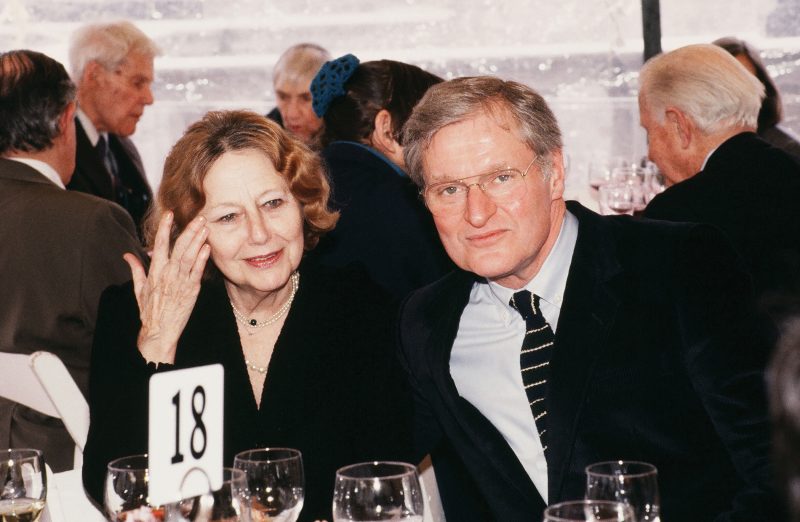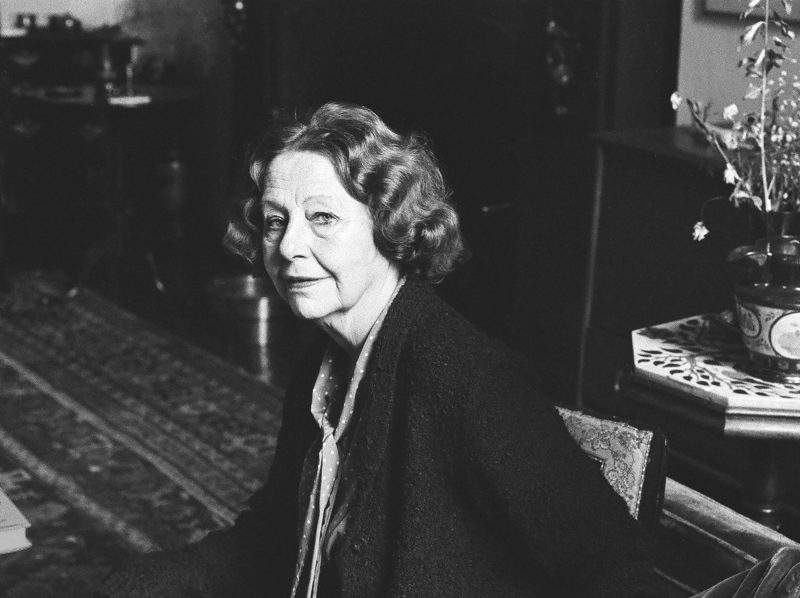Say it’s 1958, you are the wife of a famous poet, and it is your turn to have the Partisan Review gang over for drinks and barbed conversation. Maybe the line from Delmore Schwartz’s poem (“All poets’ wives have rotten lives”) runs through your head as you finish the grunt work of the hostess: emptying ashtrays, dumping half-eaten food into the trash, piling up as many glasses as you can carry to the sink. If you are Elizabeth Hardwick, your husband, Robert Lowell, is most likely passed out drunk or off having an affair-slash-breakdown with another woman. If the situation is the latter, he has renounced you and your daughter, Harriet, for a fascinating creature he suddenly cannot imagine living without, or he’s in an institution of some sort to treat the manic depression that inspires these cyclical acts of renunciation and affirmation. Lowell or no Lowell, there is much to do before you sleep: sweeping the floors, rubbing rings off places where coasters should have been, making a cursory pass over the upholstery, opening the windows to air out the smoke of a hundred pensive and hostile cigarettes. Thus the rhyming line of Schwartz’s poem: “Their husbands look at them like knives.”
Thinking about Hardwick in the domestic context should not detract from her status, as her friend Diane Johnson put it, as “part of the first generation of women intellectuals to make a mark in New York’s literary circle.” The lives of women intellectuals in the 1950s and early 1960s were not so different from those of their bluestocking predecessors in the nineteenth century. These women were expected to hostess and housewife as well as write. In fact, most would have been scandalized at the idea of not doing the former; the latter was, so to speak, gin, or gravy. As David Laskin writes in his account of the Lowell-Hardwick marriage and other couplings of that era, Partisans, for which he interviewed Hardwick extensively: “Being a wife in that crowd was a fate worse than death.” Laskin notes that most of the women chose to write under their own names rather than their husbands’, like Hardwick, Caroline Tate, and Mary McCarthy (with Diana, or Mrs. Lionel Trilling, as the notable exception). “The main thing for the women in this crowd was that they weren’t wives—except at home. Neither McCarthy nor Hardwick felt or admitted to any conflict over this domestic-literary split. If anything, they were proud of managing both so well,” writes Laskin. Yet Hardwick admitted that these gatherings were demeaning for other women. “No one paid attention to the wives at the parties,” she said, “they just sat there while everyone was drinking cheap whiskey and battling over politics.” Hardwick escaped being a wife, yet when she sat down to write she remained a woman, a fact that influenced her thinking and her criticism.

For those still offended by the hostess analogy, the best defense is that Elizabeth Hardwick was worldly enough and of a time that she would have let it stand. Joan Didion wrote of Hardwick, “Perhaps no one has written more poignantly about the ways in which women compensate for their relative physiological inferiority.” The question vital to Hardwick’s situation is whether this leads to a psychological inferiority as well. Elizabeth Hardwick, who died in December 2007, is emblematic of a long-suffering housewife, albeit one married to an extraordinary man, and one who lived among extraordinary people in extraordinary times. “I married very late, even for a Bohemian,” she said, and her belief in marriage was deeply traditional. All New York wondered how “Lizzie” put up with Lowell’s behavior; in Carol Brightman’s biography of Mary McCarthy she tells of Hardwick confiding in McCarthy, saying, “She was not the castrating ‘mother’ who withheld sex and drove her frustrated husband into the arms of younger women,” which must reflect the tenor of the gossip that circulated about Hardwick and Lowell. Though Hardwick hurt, she stayed. “The most desolating fact is that Cal and I have, by some strange miracle, a good marriage and great love for each other, except in these manic months and just before they come on,” she wrote McCarthy. Laskin, pace others, claims Hardwick deluded herself about Lowell’s affairs, but she knew; she just placed her marriage above her husband’s dalliances. She often referred to her marriage as “the best thing that ever happened to me,” as if she’d won the lottery instead of casting her lot with a genius and a madman. Laskin is deluded by Hardwick’s protesting, to him and to her friends: her work reveals a person who is much more knowing and knowledgeable than these statements for public consumption.
Yet it was never Hardwick’s intent to hitch her wagon to her husband’s star. “I had started writing before I was married to Lowell, but I was not interested in having a reputation of my own,” she told Laskin. “I had more reputation once he left me. I worked harder.” It’s nearly impossible to read her 1974 essay “Jane Carlyle,” really an account of the marriage of the Thomas Carlyles, and not think about the Lowell-Hardwicks: “As a writer [Carlyle] was self-created, like Zeus, but the living person, gruff, self-absorbed, driven, intolerant, comes to life mostly from [Jane Carlyle’s] London letters. But perhaps she never got over the feeling that she had, in choosing Carlyle, undertaken an original adventure for which credit was due her.” Hardwick casts Jane’s choice in husbands as a conscious decision to live a life of challenges, not to be ordinary. Hardwick felt an “intense dedication” to her husband, “to his life, to his brilliance.” Could Lowell have been Lowell, the great inventor of confessional poetry, without Hardwick as his partner and interrogator? She winced at his use of their private lives—sometimes abstract, sometimes quoting her actual letters—in his work, like in his brilliant “To Speak of the Woe That Is in Marriage,” an account of a wife waiting for her wayward husband to come home from his late-night prowl. Unlike Carlyle, who suffered miserably and publicly when “his Jane” died, writing a worshipful book about his lost wife despite his scandalous treatment of her, Lowell only had the briefest of lives without Lizzie. In a bitter piece of dramatic irony he died of a heart attack in a taxi en route from Kennedy Airport to their shared apartment on West Sixty-seventh Street in 1977, on his way back to her from yet another woman, Lady Caroline Blackwood, whom he had actually married.
Unlike Jane Carlyle’s, Hardwick’s genius was not limited to private letters. She too got to create herself, as a novelist, a teacher, and, most powerfully, as a critic. The bones of her biography are a classic fish-out-of-water tale, a Kentucky belle in the big city, but Hardwick was more like Walt Whitman tending the wounded in the Civil War hospital than Scarlett O’Hara at the Twelve Oaks barbecue—after all, she had a husband who needed constant bandaging (straitjacketing, really). Nevertheless she was a Southerner in the north; even though Hardwick didn’t put much stock in the idea that we “all are linked naturally to their regions,” as she wrote in her novel Sleepless Nights (1979), she does think “it is not true that it doesn’t matter where you live.” New York was hers, as Nights makes abundantly clear. Jim Lewis observes in his tribute to her on Slate.com that she was “one of the last survivors of a group of extraordinary women, many from the West or the South, who redefined the American essay: Pauline Kael, Susan Sontag, Joan Didion, and M.F.K. Fisher, all from California, Mary McCarthy from Seattle.” She certainly harbored geographical ambitions. Her New York Times obituary recounts one from an interview in 1979: “My aim was to be a New York Jewish Intellectual. I say ‘Jewish’ because of their tradition of rational skepticism; and also a certain deracination appeals to me—and their openness to European culture.” Thus it is a bit twisted that though she floated among the Rahvs and the Kazins, the man she married was the deepest indigo of Boston blue bloods; and the analytical quality she associated with Semitism was not totally absent, but not dominant, in Robert Lowell, casually nicknamed “Cal” (for Caliban and Caligula, and for his tendency toward decadence and excess) by his prep-school chums. Yet anyone who ever read a word she wrote knows she did not suffer in silence. Hardwick remade herself as a New Yorker, but her feeling that she was never of the world she lived in, neither a real Jewish Intellectual nor at home with the Cabots and the Lodges, helped her find an original voice.
The Lowells settled first in Boston, a city she hated so much it fueled an essay, “Boston,” in 1959 (“wrinkled, spindly-legged, depleted of nearly all her spiritual and cutaneous oils’’), then in her adopted hometown, New York. There she was the quietest of a trio of female voices—the others being the precocious, brasher and brassier Susan Sontag and the more promiscuous and productive Mary McCarthy. All were involved in the founding of the New York Review of Books in 1963, Hardwick and Lowell more instrumentally than the others. Hardwick wrote a wicked satire of McCarthy’s potboiler The Group (1963) called The Gang for the paper under the pseudonym Xavier Prynne. McCarthy was puzzled and hurt. Hardwick defended herself: “It was meant as simply a little trick,” she wrote her friend. The literary world was on the attack because McCarthy had managed to produce that elusive feather in an intellectual’s cap: a true best seller. Was Hardwick a little envious, or a little disgusted at her comrade in seriousness for writing what amounted to a high middlebrow soap opera? “Please believe I am your loyal friend and I hope a formidable one,” she begged McCarthy, but that choice of pen names seems to be a direct attack on McCarthy’s fondness for exploring—or exploiting—female sexuality in her fiction (The Group raised a ruckus because it dealt frankly with both premarital sex and birth control). In a separate letter, Lowell wrote to McCarthy that “the entire Partisan Review world seems to be throwing bricks at one another.” It was true that an era had passed, but better times were ahead for Hardwick. Her turn at brick throwing had just begun.
But Hardwick was no prude. She and her work were tough, not shy or blushing. This was an oft-repeated epithet about her character: “She was so tough, everyone says in amazement as they look back over the decades of insanity and infidelity: tough and tough-minded.” It was true of her work as well. In the New York Review she had her best venue, delivering essays up to her own standard: “full of personality, eloquence and daring.” Her criticism often identified with mad or tortured women, what Didion identified as “women adrift”: Dorothy Wordsworth, Charlotte Brontë, Samuel Richardson’s Pamela, Zelda Fitzgerald—rather than madmen and the women who loved them. Her decision to tackle Melville, the most important nineteenth-century writer of her time, was both brave and triumphant, and her later writings on Philip Roth, Richard Ford, and Joan Didion proved she was someone who was not always looking retrospectively for subjects. She also didn’t limit herself to the literary highbrow: Hardwick relished a juicy murder trial, writing about O.J. and the Menendez brothers.
Hardwick’s allure is that of the shadowy yet influential character. For someone who shunned the spotlight—I think of her as a George Harrison figure—as Sontag and McCarthy and Lillian Hellman bombarded the culture with noise, she quietly turned out something as gorgeous and perfect as Harrison’s 1970 three-album solo epic All Things Must Pass. It is in a subtler, more sensual style, and one that took longer to develop than those of her contemporaries. But it was deeply private, and unmistakably hers, and completely seductive, to borrow a term she understood better than any critic writing today. Her loss is a real one, and she came from a place that may no longer exist: the writer who understands her text as history, as family, and as life. Hardwick as a critic was like Hardwick as a hostess: she did the grunt work as gracefully as the glamorous work, slipping in the plot, the theme, and her unlikely brilliant discoveries as if it were as easy as introducing two long-lost friends, in the meantime leaving no glass unwashed, no surface unpolished. After reading a Hardwick piece you leave knowing more, feeling stimulated and happy, with a sense that she has pulled off that most difficult of tasks: making the difficult seem effortless.

Gender might be a clichéd lens through which to look at Hardwick’s criticism, but it’s a fair one. She was conscious of the world, literary and lived, as comprising men, women, and their intersections, both rough and gentle. Her best collection of criticism, Seduction and Betrayal, addressed these themes head-on. She winces at the reality of the Fitzgerald marriage as it is retold in Nancy Milford’s 1970 biography Zelda: “By concentration upon her subject, and even perhaps by inadvertence, [Milford] has brought troubling thoughts to our minds, shifted the balance of things, and made it possible for the reader to see in the unhappy woman—a fleeting paragon of the 1920s—an instance of unexpected moral complexity, an example of peculiar failure and the object of a kind of unnamable justice—domestic, social, cultural?—and the victim of many miseries that were not always unavoidable.” She pities Zelda her lack of an outlet for self-expression, her unfed desire for art. In her essay on Sylvia Plath, Hardwick treads a path many other critics have walked before: “Her fate and her themes are hardly separate and both singularly terrible. Her work is brutal, like the smash of a fist; and sometimes it is also mean in its feeling.” But she notices, from the opening, something different from those who would sidle up to the brutish yet bathetic poet: “For all of the drama of her biography, there is a peculiar remoteness about Sylvia Plath. A destiny of such violent self-definition does not always bring the real person nearer; it tends, rather, to invite iconography, to freeze our assumptions and responses.” Hardwick tries to work around this, as it were, to let the poems stand separate from the legend. When at the end of the essay she finds a recording of Plath reading her own poems, she is struck by the poet’s naturalness. The poems were read “beautifully,” “projected in full-throated, plump, diction-perfect, Englishy, mesmerizing cadences, all round and rapid, and paced and spaced.” The voice Plath had fought so hard for during her lifetime seemed easy and natural in its eternal state, much like Hardwick’s does.
When she turned to a full-length book of criticism she chose the American writer who had entranced the male critics of her generation: Herman Melville. Hardwick comes to Melville with fresh eyes and her female perspective, suggesting that perhaps Melville’s struggles for financial and critical success had transformed him into a man with compulsive and compensatory urges. Her approach to Melville is, in part, to feminize his heroes, many of whom are lacking something, real or imaginary—Ahab’s leg, Bartleby’s will, and Queequeg’s loneliness, his thirst for companionship that can only be quenched by the camaraderie of men at sea. Hardwick understands Melville’s ache to explore, to romance in the nineteenth-century sense—to use the mechanism of plot to explore some cultural fantasy about the forbidden. In Melville, whose novels cover everything from incest to cannibalism, she has rich topography to cover indeed. She takes the dreams of his characters with the seriousness that Melville took his own ambitions to write, and his failure to make a mark on his time seems to hurt her deeply. Hardwick is duly skeptical of those who have preceded her in trying to plumb the murkiness of Melville: “The assembled family cannot have had any idea of this reluctant head of the household. Nor can the graduate students with their theses, the annotators, the eyes searching passages marked in his books, the critics, the biographers in long, long efforts and short ones. It must be said about Melville that he earned the mystery of his inner life.” It is hard to think of a greater compliment from one writer to another—not as an admission of failure to penetrate the heart of him, but as an admiration for the complexity of what she has found.
In Sleepless Nights, her best novel, a meditation close to autobiography, Hardwick ponders a life she never could have had: that of a bachelor. This was, in extremis, another character she often wrote about, a cad, like Samuel Richardson’s Lovelace or Brontë’s Heathcliff, equally forbidden and fascinating to her. This is not surprising, in a sense, as she knew one intimately. “I often think about bachelors,” she writes. “A life of pure decision, of thoughtful calculations, of every inclination honored. They go about on their own, nicely accompanied in their singularity by the companion of possibility. For cannot any man, young or old, rich or poor, turn a few corners and bump into marriage?” It is tempting to wonder what Elizabeth Hardwick’s life might have been like if she had had the option of pure decision, if she had remained an unmarried Bohemian. What if she had not bumped into marriage (into that marriage), if she had turned the corner toward Baton Rouge and the Southern agrarians instead of New York (a real choice she faced), if she had been content as a mere poet’s wife with a rotten life? Would she have been happier? I think not. And the world would be a lot poorer in prose.





